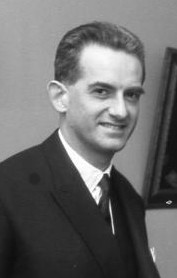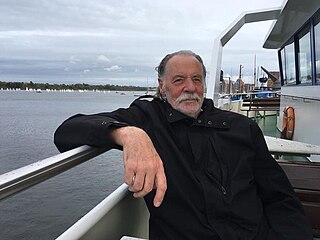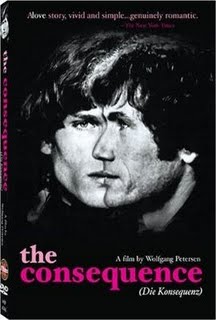
Wolfgang Petersen was a German filmmaker. He was nominated for two Academy Awards for the World War II submarine warfare film Das Boot (1981). His other films include The NeverEnding Story (1984), Enemy Mine (1985), In the Line of Fire (1993), Outbreak (1995), Air Force One (1997), The Perfect Storm (2000), Troy (2004), and Poseidon (2006).
New German Cinema is a period in German cinema which lasted from 1962 to 1982, in which a new generation of directors emerged who, working with low budgets, and influenced by the French New Wave and Italian Neorealism, gained notice by producing a number of "small" motion pictures that caught the attention of art house audiences. These filmmakers included Percy Adlon, Harun Farocki, Rainer Werner Fassbinder, Peter Fleischmann, Werner Herzog, Alexander Kluge, Ulli Lommel, Wolfgang Petersen, Volker Schlöndorff, Helma Sanders-Brahms, Werner Schroeter, Hans-Jürgen Syberberg, Margarethe von Trotta and Wim Wenders. As a result of the attention they garnered, they were able to create better-financed productions which were backed by the big US studios. However, most of these larger films were commercial failures and the movement was heavily dependent on subsidies. By 1977, 80% of a budget for a typical German film was ensured by a subsidy.

Henry Marie Joseph Frédéric Expedite Millon de Montherlant was a French essayist, novelist, and dramatist. He was elected to the Académie française in 1960.

Pierre Roger Peyrefitte was a French diplomat, writer of bestseller novels and non-fiction, and a defender of gay rights and pederasty.

Les amitiés particulières is a 1943 novel by French writer Roger Peyrefitte, probably his best-known work today, which won the Prix Renaudot. Largely autobiographical, it deals with an intimate relationship between two boys at a Roman Catholic boarding school and how it is destroyed by a priest's will to protect them from homosexuality.

Helmut Käutner was a German film director active mainly in the 1940s and 1950s. He entered the film industry at the end of the Weimar Republic and released his first films as a director in Nazi Germany. Käutner is relatively unknown outside of Germany, although he is considered one of the best filmmakers in German film history. He was one of the most influential film directors of German post-war cinema and became known for his sophisticated literary adaptations.

Baron Jacques d'Adelswärd-Fersen was a French novelist and poet. His life forms the basis of a fictionalised 1959 novel by Roger Peyrefitte entitled The Exile of Capri.
Herbert Lichtenfeld was one of the most successful television screenplay writers in Germany. He wrote over 300 film scripts. Many of his scripts were successful in Germany.

Peter Fleischmann was a German film director, screenwriter and producer. He worked also as an actor, cutter, sound engineer, interviewer and speaker. Fleischmann belonged to the New German Cinema of the 1960s and 1970s. He is known for directing the 1969 Jagdszenen aus Niederbayern, but he produced films of many genres.

Guy Hocquenghem was a French writer, philosopher, and queer theorist.

Alain Peyrefitte was a French scholar and politician. He was a confidant of Charles de Gaulle and had a long career in public service, serving as a diplomat in Germany and Poland. Peyrefitte is remembered for his support for partitioning Algeria amid the Algerian War.
Ernst Hannawald is a German television actor, best known for his role in The Consequence.
Literaturoper, a term coined by the German music critic Edgar Istel, describes a genre of opera that emerged during the late 19th century. When an existing play for the legitimate theatre is set to music without major changes and without the intervention of a librettist, a “Literaturoper” is the result. Although the term is German, it can be applied to any kind of opera, irrespective of style or language.

Bernd Schroeder was a German writer who authored books, television plays, film scripts, and audio plays. He also directed audio plays. He co-authored the bestseller novel Alte Liebe with Elke Heidenreich, and received several awards including the Grimme-Preis.
Alexander Ziegler was a Swiss author and actor.
Klaus Schwarzkopf was a German actor. From 1971 until 1978 he starred in the Norddeutscher Rundfunk version of the popular television crime series Tatort. He was also known as a respected stage actor and for being the German dubbing voice of Peter Falk as Columbo during the 1970s.

Die Deutsche Kinemathek – Museum für Film und Fernsehen is a major German film archive located in Berlin.
![<i>Das Millionenspiel</i> 1970 [[West Germany]] TV series or program](https://upload.wikimedia.org/wikipedia/en/a/a9/Das_Millionspiel.jpg)
Das Millionenspiel is a 1970 German action/sci-fi television film, directed by Tom Toelle and starring Jörg Pleva, Suzanne Roquette and Dieter Thomas Heck. It was aired by ARD (broadcaster) on 18 October 1970. Wolfgang Menge wrote the screenplay, adapting the short story "The Prize of Peril" by the American writer Robert Sheckley. Wolfgang Menge and Tom Toelle received the 1971 Prix Italia for best television movie.

Jaecki Schwarz is a German actor. With around 120 film and television roles throughout his career, he worked prolifically with DEFA, the East German state-owned film studio, as well as Deutscher Fernsehfunk (DFF), the state television broadcaster in the GDR. Since the reunification of Germany, he has been known for his roles in the long-running detective television series Polizeiruf 110 as well as the crime series Ein starkes Team.
André Baudry was a French writer who was the founder of the homophile review Arcadie.












![<i>Das Millionenspiel</i> 1970 [[West Germany]] TV series or program](https://upload.wikimedia.org/wikipedia/en/a/a9/Das_Millionspiel.jpg)
